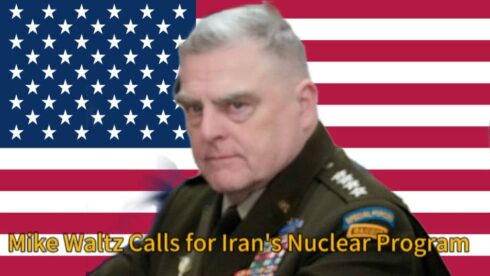Mike Waltz, White House National Security Adviser has declared the United States’ unwavering stance on Iran’s nuclear ambitions, emphasizing the necessity for a complete dismantlement of Tehran’s nuclear program. This announcement underscores the administration’s commitment to preventing the proliferation of nuclear weapons in the Middle East. National Security Adviser Mike Waltz articulated the administration’s firm position, stating that the U.S. seeks the full dismantlement of Iran’s nuclear infrastructure. He emphasized that partial measures or temporary suspensions are insufficient, advocating for a transparent and verifiable cessation that assures the international community of Iran’s non-nuclear status.
Mike Waltz highlighted the global ramifications of a nuclear-armed Iran, suggesting that it could trigger a regional arms race and destabilize international security. He reiterated that all options, including diplomatic and military avenues, remain under consideration to ensure Iran’s compliance with global non-proliferation norms.
Diplomatic Overtures and Iran’s Response
In an effort to resolve the nuclear impasse diplomatically, President Donald Trump extended a letter to Iran’s Supreme Leader, Ayatollah Ali Khamenei, proposing negotiations for a new nuclear agreement. The correspondence underscored the urgency of the matter, offering dialogue as a means to avert potential military confrontations.
However, the overture was met with resistance. Ayatollah Khamenei dismissed the proposal, labeling it as deceptive, while Iran’s UN mission expressed willingness to discuss certain aspects but firmly rejected the notion of dismantling its nuclear program entirely.
Mike Waltz: Reinstatement of ‘Maximum Pressure’ Strategy
The administration has signaled a revival of the ‘maximum pressure’ campaign, aiming to economically isolate Iran through stringent sanctions, particularly targeting its vital oil exports. This strategy aspires to compel Tehran to engage in negotiations and curb its nuclear ambitions by leveraging economic constraints.
National Security Adviser Mike Waltz and Secretary of State Marco Rubio have been pivotal in advocating for this hardline approach, reflecting a broader shift in U.S. foreign policy towards a more assertive stance against perceived threats.
Mike Waltz: Regional Implications and Israeli Involvement
The U.S. position has garnered support from regional allies, notably Israel. Israeli Prime Minister Benjamin Netanyahu has actively sought to align with the U.S. in countering Iran’s nuclear activities, even contemplating preemptive strikes on Iranian nuclear sites. This collaboration underscores the shared objective of preventing Iran from attaining nuclear weapon capabilities.
The potential for Israeli military action, coupled with U.S. support, adds a layer of complexity to the geopolitical landscape, raising concerns about escalating tensions and the prospect of broader conflict in the region.
Global Reactions and Strategic Calculations
The international community remains divided over the U.S. approach. While some European allies advocate for continued diplomatic engagement and a revival of the Joint Comprehensive Plan of Action (JCPOA), others express apprehension about Iran’s advancing nuclear capabilities and support the U.S.’s stringent measures.
China and Russia, both signatories of the original JCPOA, have criticized the U.S.’s withdrawal from the agreement and the subsequent sanctions, arguing that these actions exacerbate regional instability and hinder diplomatic solutions.
Future Prospects and Potential Outcomes
The steadfast U.S. demand for a full dismantlement of Iran’s nuclear program sets a high bar for any prospective negotiations. Iran’s reluctance to comply with such terms suggests a protracted impasse, with the looming threat of military confrontation if diplomatic efforts falter.
The coming months are pivotal, as both nations navigate a complex interplay of strategic interests, regional alliances, and international pressures. The outcome of this standoff will significantly influence the future of non-proliferation efforts and stability in the Middle East.














